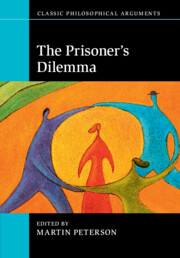Book contents
- Frontmatter
- Contents
- List of contributors
- Introduction
- 1 Why all the fuss? The many aspects of the Prisoner's Dilemma
- 2 How I learned to stop worrying and love the Prisoner's Dilemma
- 3 Taking the Prisoner's Dilemma seriously: what can we learn from a trivial game?
- 4 Prisoner's Dilemma doesn't explain much
- 5 The Prisoner's Dilemma and the coevolution of descriptive and predictive dispositions
- 6 I cannot cheat on you after we talk
- 7 Prisoner's Dilemma cannot be a Newcomb Problem
- 8 Counterfactuals and the Prisoner's Dilemma
- 9 The Tragedy of the Commons as a Voting Game
- 10 The role of numbers in Prisoner's Dilemmas and public good situations
- 11 The inner struggle: why you should cooperate with people you will never meet again
- 12 Prisoner's Dilemmas, intergenerational asymmetry, and climate change ethics
- 13 Prisoner's Dilemma experiments
- 14 The lesson of the Prisoner's Dilemma
- Bibliography
- Index
6 - I cannot cheat on you after we talk
Published online by Cambridge University Press: 05 July 2015
- Frontmatter
- Contents
- List of contributors
- Introduction
- 1 Why all the fuss? The many aspects of the Prisoner's Dilemma
- 2 How I learned to stop worrying and love the Prisoner's Dilemma
- 3 Taking the Prisoner's Dilemma seriously: what can we learn from a trivial game?
- 4 Prisoner's Dilemma doesn't explain much
- 5 The Prisoner's Dilemma and the coevolution of descriptive and predictive dispositions
- 6 I cannot cheat on you after we talk
- 7 Prisoner's Dilemma cannot be a Newcomb Problem
- 8 Counterfactuals and the Prisoner's Dilemma
- 9 The Tragedy of the Commons as a Voting Game
- 10 The role of numbers in Prisoner's Dilemmas and public good situations
- 11 The inner struggle: why you should cooperate with people you will never meet again
- 12 Prisoner's Dilemmas, intergenerational asymmetry, and climate change ethics
- 13 Prisoner's Dilemma experiments
- 14 The lesson of the Prisoner's Dilemma
- Bibliography
- Index
Summary
6.1 Introduction
The experimental literature on social dilemmas has long documented the positive effect of communication on cooperation. Sally (1995), in a meta-analysis spanning thirty-five years of Prisoner's Dilemma experiments, shows that the possibility of communicating significantly increases cooperation. Social psychologists have explained such a finding by hypothesizing that the act of communicating contributes to promoting trust by creating empathy among participants (see Loomis (1959), Desforges et al. (1991), Davis and Perkowitz (1979)). Bicchieri (2002, 2006), in a different perspective, puts forward a focusing function of communication hypothesis, according to which communication can focus agents on shared rules of behavior and – when it does focus them on pro-social ones – generates a normative environment which is conducive to cooperation. More specifically, when individuals face an unfamiliar situation, they need cues to understand how best to act and, for this reason, they check whether some behavioral rule they are aware of applies to the specific interaction. The effect of communication is to make a behavioral rule situationally salient, that is, communication causes a shift in an individual's focus towards the strategies dictated by the now-salient rule. In doing so, communication also coordinates players' mutual expectations about which strategies will be chosen by the parties. In other words, (under some conditions) communication elicits social norms.
While a large proportion of studies on the effect of pre-play communication focuses on Prisoner's Dilemma games, Bicchieri, Lev-On, and Chavez (2010) examine behavior in sequential trust games. In what follows we shall look at those findings, discuss an interpretation based on the above hypothesis, and suggest a theoretical application that can account for it. Given that our analysis equally applies to the Prisoner's Dilemma, this essay contributes to the broad literature on social dilemmas by proposing an application for dynamic interactions.
Bicchieri (2002) provides the basis for the focusing function of communication argument: when a rule of behavior becomes situationally salient, it causes a shift in an individual's focus, thereby generating empirical and normative expectations that direct one's actions.
- Type
- Chapter
- Information
- The Prisoner's Dilemma , pp. 101 - 114Publisher: Cambridge University PressPrint publication year: 2015
- 2
- Cited by

